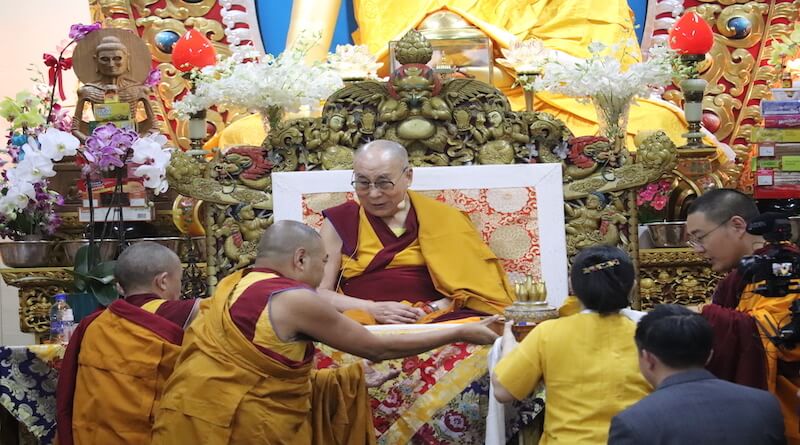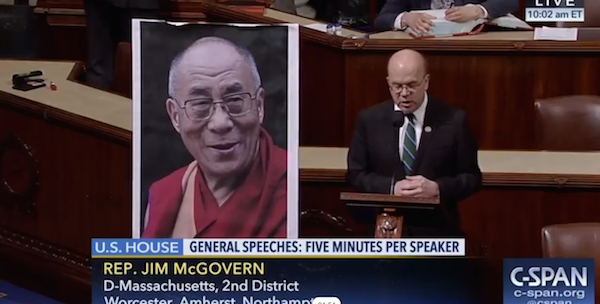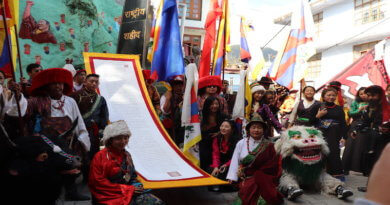His Holiness begins three-day teaching to Asian devotees
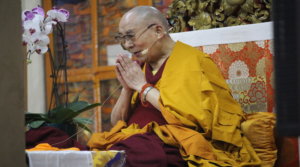
DHARAMSALA, 4 Sept: His Holiness the Dalai Lama began three-day teaching today at Tsug-lag-Khang, the main temple in McLeod Ganj, Dharamshala.
The teaching from 4-6 September is being held at the request of a group from Asian countries including Indonesia, Korea, Malaysia, Singapore, Thailand and Vietnam.
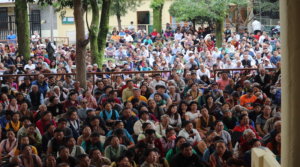 Over seven thousand devotees from 67 countries across the world including 800 from Asian countries have gathered to attend the first day of the four-day teaching on The Four Noble Truths and their Sixteen Characteristics, The Thirty-Seven Factors of Enlightenment as well as Nagarjuna’s Commentary on Bodhichitta.
Over seven thousand devotees from 67 countries across the world including 800 from Asian countries have gathered to attend the first day of the four-day teaching on The Four Noble Truths and their Sixteen Characteristics, The Thirty-Seven Factors of Enlightenment as well as Nagarjuna’s Commentary on Bodhichitta.
The Tibetan spiritual leader began by greeting the devotees who have come from different parts of the world for the discourse and thanked the organisers.
“Those of you who have come from different parts of the world, I welcome you and greetings to everyone. Since many years, you have been coming here with great keenness and interest to the dharma discourse,” His Holiness said.
“There are many religious traditions in the world and they have different philosophical ideas. But all of them preaches compassion, contentment, tolerance and self-discipline. Religion is like medicine, and there is no single medicine that suits all. Like we can not pick up a particular medicine and declare it as the best medicine, the same thing applies to Religion,” the Dalai Lama added.
 The Dalai Lama then spoke about his four commitments; to promote essential values that will make us happier such as warm-heartedness, compassion, forgiveness, tolerance, contentment and self-discipline; promotion of religious harmony: being a Tibetan and as the ‘Dalai Lama’ -the focus of the Tibetan people’s hope and trust- to preserve Tibetan language and culture, while also speaking up for the protection of Tibet’s natural environment and the revival of the value of Nalanda ancient Indian knowledge among young Indians today.
The Dalai Lama then spoke about his four commitments; to promote essential values that will make us happier such as warm-heartedness, compassion, forgiveness, tolerance, contentment and self-discipline; promotion of religious harmony: being a Tibetan and as the ‘Dalai Lama’ -the focus of the Tibetan people’s hope and trust- to preserve Tibetan language and culture, while also speaking up for the protection of Tibet’s natural environment and the revival of the value of Nalanda ancient Indian knowledge among young Indians today.
The Tibetan Nobel Laureate then exhorted his followers to cultivate faith based on the understanding of the Buddha’s teachings and reasoning rather than blind faith, by using one’s intelligence to the maximum and transforming one’s emotions.
His Holiness conducted the discourse in Tibetan while the translation was available in English, Chinese, Korean, Vietnamese, Japanese, Hindi, Italian, Spanish and Russian.

